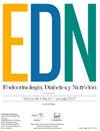Distortion of body image perception in the Prader-Willi syndrome: Relationship with the perceptual reasoning index
IF 1.8
4区 医学
Q4 ENDOCRINOLOGY & METABOLISM
引用次数: 0
Abstract
Introduction
Self-perception of body image has been scarcely evaluated in people with Prader-Willi syndrome (PWS), who, in addition to intellectual disability, are often obese. Therefore, we explored whether people with PWS can accurately identify their true image and how this self-perception is impacted by their neuropsychological profile.
Methodology
This observational study included patients with PWS with regular attendance to transdisciplinary treatment at a center specialized in the management of rare diseases. All patients were evaluated with the Stunkard scale (including silhouettes ranging from extremely skinny to extremely obese) and the WISC-IV and WAIS-III questionnaires, specifically the perceptual reasoning index (PRI).
Results
Among the 21 participants, 62% misperceived their body image, most underestimating their body dimensions (actual BMI 28.0 ± 8.3 kg/m2 vs self-perceived BMI 23.2 ± 4.7 kg/m2, p = 0.03). While BMI differences between accurate and inaccurate body image perception were nonsignificant (accurate 26.6 ± 8.8 kg/m2 vs inaccurate 28.9 ± 8.1 kg/m2, p = 0.56), individuals with accurate perception showed both higher PRI scores (accurate 67.6 ± 8.2 vs inaccurate 60.2 ± 7.2, p = 0.043) and, to a lesser extent, intelligence quotients (IQ) (accurate 60.0 ± 4.9 vs inaccurate 55.0 ± 7.5, p = 0.079).
Conclusion
In this study, we identified distortion of body image perception as a very common finding among PWS patients, in most cases as underestimation, and influenced by the neuropsychological profile.
Prader-Willi综合征的身体形象知觉扭曲:与知觉推理指数的关系
普瑞德-威利综合征(PWS)患者对身体形象的自我认知几乎没有得到评估,这些患者除了智力残疾外,还经常肥胖。因此,我们探讨了PWS患者是否能够准确地识别自己的真实形象,以及这种自我感知如何受到他们的神经心理特征的影响。方法:本观察性研究纳入了定期到罕见病专业治疗中心接受跨学科治疗的PWS患者。所有患者采用Stunkard量表(包括从极瘦到极胖的轮廓)和WISC-IV和WAIS-III问卷,特别是知觉推理指数(PRI)进行评估。结果在21名被试中,62%的被试对自己的身体形象存在误解,其中大多数低估了自己的身体尺寸(实际BMI 28.0±8.3 kg/m2 vs自我感知BMI 23.2±4.7 kg/m2, p = 0.03)。虽然准确和不准确的身体形象感知之间的BMI差异不显著(准确26.6±8.8 kg/m2 vs不准确28.9±8.1 kg/m2, p = 0.56),但准确感知个体的PRI得分较高(准确67.6±8.2 vs不准确60.2±7.2,p = 0.043),智商(IQ)得分较低(准确60.0±4.9 vs不准确55.0±7.5,p = 0.079)。结论在本研究中,我们发现PWS患者身体形象感知扭曲是一个非常普遍的发现,在大多数情况下是低估,并受神经心理特征的影响。
本文章由计算机程序翻译,如有差异,请以英文原文为准。
求助全文
约1分钟内获得全文
求助全文
来源期刊

Endocrinologia Diabetes Y Nutricion
Multiple-
CiteScore
2.10
自引率
10.50%
发文量
99
期刊介绍:
Endocrinología, Diabetes y Nutrición is the official journal of the Spanish Society of Endocrinology and Nutrition (Sociedad Española de Endocrinología y Nutrición, SEEN) and the Spanish Society of Diabetes (Sociedad Española de Diabetes, SED), and was founded in 1954.
The aim of the journal is to improve knowledge and be a useful tool in practice for clinical and laboratory specialists, trainee physicians, researchers, and nurses interested in endocrinology, diabetes, nutrition and related disciplines.
It is an international journal published in Spanish (print and online) and English (online), covering different fields of endocrinology and metabolism, including diabetes, obesity, and nutrition disorders, as well as the most relevant research produced mainly in Spanish language territories.
The quality of the contents is ensured by a prestigious national and international board, and by a selected panel of specialists involved in a rigorous peer review. The result is that only manuscripts containing high quality research and with utmost interest for clinicians and professionals related in the field are published.
The Journal publishes Original clinical and research articles, Reviews, Special articles, Clinical Guidelines, Position Statements from both societies and Letters to the editor.
Endocrinología, Diabetes y Nutrición can be found at Science Citation Index Expanded, Medline/PubMed and SCOPUS.
 求助内容:
求助内容: 应助结果提醒方式:
应助结果提醒方式:


